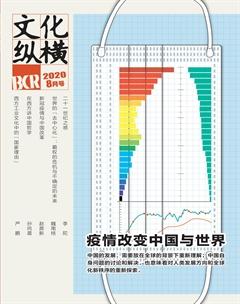英文目录
Overseas
10
USA: Back to the “House Divided”?
Wu Shuang
Feature Article
14
Puzzle of the 21st Century: Questions and Answers on the COVID-19 Crisis and Contemporary Capitalism
Li Tuo
The ongoing COVID-19 crisis and the global transformation since the 2008 financial crisis have brought vast changes to the main issues and concerns of the contemporary world. However, the knowledge framework formed in the 20th century can hardly help in making sense of todays condition. To understand contemporary capitalism, it is indispensable to rethink socialism as its intertwined counterpart, especially socialist practice of contemporary China.
34
Cover Story: COVID-19 Changes China and the World
36
The Covid-19 Pandemic Crisis and The Task of Chinas Intellectual Circles
Ke Guifu
Zheng Tao
42
The Decentralizing World: The Crisis of Hegemony and an Uncertain FutureWei Nanzhi
The world has started a “decentralization” process in 21st century, especially after the outbreak of the financial crisis in 2008. This trend is presented in a dual process: first, the world system is slowly evolving from a center-peripheral structure to a network structure; second, the main body of world order is no longer limited to sovereignty states, but in multiple forms.
51
Where Will U.S.s Long-term Financial Capital Go?
Tang Yinan
60
Will Difficulties Lead to Revival? The Pandemic and the EUs Crisis of Order
Zhang Yongle
69
COVID-19 and Chinas Reform
Zhao Dingxing
78
Multi-Level Coordination: the “Yiwu Model” of Globalization
Qian Linliang
Under the Heaven
86
Lecturing Chinese Philosophy in the West
Sun Xiangchen
Neither explaining Chinese thought through Western resources nor explaining Chinese thought through Chinese resources is capable to enhance Westerners understanding of Chinese philosophy. The author consider comparing Chinese and Western philosophy from a framework perspective, thus to return the fundamental framework of Chinese value.
Theories and Practices in Philanthropy
98
The “Chinese approach of Cooperation” of Philanthropy: Experiences of Shannxi Womens Research Association
Gao Xiaoxian
The author shared the work experiences at Shannxi Women Research Association, and pointed out the specialty of GAD (gender and development) practice in China. While receiving theories and intervention framework of existed GAD resources, the association has borrowed much local experiences and resources of women works at practical level, thus to develop and innovate the meaning and form of GAD.
108
Value and Reflection of Local Traditional Philanthropic Culture: Example from Cunxin Shantang in Shantou
Han Junkui
Cunxin Shantang, though interrupted for several times, has lasted for over one hundred years until today, and preserved certain characteristics: its foundation of popular belief, strong sense of mission and voluntarism. Such organizational principle, which represents the essence of philanthropy, is worthy of more attention.
Rethinking World History
116
Raison d?tat” in Western Industrial Culture
Yan Peng
The article argues that the Industrial Revolution did not emerge from an ideal free-market environment. On the contrary, it is the product of the intervention of strong state power. However, the countries who have achieved industrialization through state power intentionally hid the role of state, and constructed a myth of universal “free market”, and promoted it to less modernized countries.
Urban Political Economics
127
What Kind of Disease is Urban Disease
Tan Zongbo
Urban diseases usually emerge when cities develop and expand. In essence, they are side effects of human settlements increasing density. Yet, problems existed in modern cities have various reasons and forms, and it may be improper to categorize all of them under the concept “urban disease”.
Urban Political Economics
134
The Historical Change and Modern Implications of Xiao-kang s Meaning
Zhang Wen

